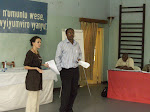.JPG)

Picture1: the main streets of Malakal during the rainy season
Picture 2: The bread Shop from my front door
Dear All,
This is my third return to Malakal this year since we left having spent a year living here and I am continually stuck by the changes. And it is not just that things are changing, as everywhere things change, but how quickly they seem to be changing and dare I say it improving.
In expectation of the rains which inflict themselves upon this area between June and September every year, the UN, International and Local NGOs and the Government have been begun to replace the long since disappeared British (circa 1930's) street drainage system. In the main market this has meant brick lined culverts have appeared Suring up what is left of the road and amazingly making them passable even in the hardest rain. For the rest of town a lone big digger is trawling the streets, an automatic beast of mercy, cutting channels wherever it goes to guide the water which will not seep into the land down to the river. Although a small step by most standards, for Malakal this is a huge milestone, for if the stagnant water that sits after the rains can be disbursed it will not only make movement of people and goods possible but remove the breeding ground for the mosquitoes which thrive during August sending Malaria through the roof.
You will see from the photo of the route from the front door where I stay to my shop which I must traverse every morning to get fresh bread for breakfast that the curse of Malakal is mud. Malakal was never intended as a place for people to live. The tribes of the area, both Shilluk and Dinka never settled the area in major numbers knowing that in affect it was a swamp, they preferred the high ground further in land, and across the river to the North. However when the British looked for a resting place while traversing the Nile towards the impenetrable Sud Malakal seemed the perfect spot. Its location just North of the entrance to the Sobot river and just before the Nile begins its course through into the swamps seemed ideal. The land at the rivers edge where the Government buildings were placed is slightly raised and gave good access to the river. However once but 100 metres in from the river bank the land descends almost imperceptibly but those few centimetres make the difference between dry and wet, in a real sense often the difference of life and death during the long rains. Coupled with this the nature of the soil of Malakal known as 'Black Cotton' means that it does not absorb the all the water, it settles on top in large puddles attracting infection and disease. Added again to this is the soils quality of glue likeness, sticking with an iron hold to everything that touches it (except for the most part the barefoot) and refuses to let go. The walk to the shop becomes a workout of mr universe proportions with great balls of mud collecting and being carried along with you.
So as I arrived now in August life has ground to a halt, no cars move, no donkey carts pass, just those people who must venture out to complete those tasks that cannot wait until its truly dry. Now this is of course a mixed blessing for the cool winds that signal the rains which come coupled with a dark yet iridescent sky are one of the true havens of Malakal. For once you have endured the heat and sweat of February through to June to feel that first wind of change is like a wake up call to life, suddenly as the temperature plummets from 45-50 Celsius to 20 Celsius you realise how life can be lived and rejoice.
But of course there is also another story within this for as I am struggling with my bag to traverse the lake which is encircling the place I will stay for my time in Malakal I pass the church and diocesan office and take rest. And in this moment of rest I hear the first news of the projects that we support and am amazed to hear that in this time of mud and rain and difficulty they are on track and well over 50% complete, new classrooms built and new water systems installed. They refuse to be held down by the environment, and by the apathy that has infected so much of post war life. They want change, and they are not the only one, and it is change they are making happen, school by school, child by child.
Every Blessing
Simon


No comments:
Post a Comment